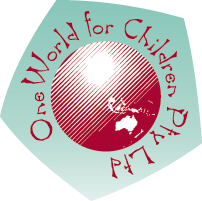Staffing Policy
 Policy
Policy
One World Children’s Centre will employ sufficient numbers of educators, taking into consideration qualifications and experience to meet legislative, policy and service standards,
Legislation
Education and Care Services National Law Act 2010: Sections 12, 13, 14, 161, 162, 165, 169
Education and Care Services National Regulations 2011: Regulations 14, 15, 16, 46, 47, 48, 49, 83, 84, 118, 120, 121–123, 125–126, 129–135, 136, 137–143, 145–152, 355, 357, 358, 360–364
Equal Opportunity Act 2010 (Vic)
Fair Work Act 2009
Information Privacy Act 2000 (Vic), as amended 2011
National Quality Standard, Quality Area 4: Staffing Arrangements
Privacy Act 1998 (Cth), as amended 2011
Working with Children Act 2005 (Vic)
Working with Children Regulations 2006 (Vic)
Definitions:
The terms defined in this section relate specifically to this policy.
Actively working towards: An educator who is enrolled in a course for a qualification, and provides the Approved Provider with documentary evidence of their commencement in the course, their satisfactory progress towards completion of the course and ongoing evidence that they are meeting all the requirements to maintain their enrolment. Educators who are ‘actively working towards’ an approved diploma-level qualification must also hold an approved certificate III level education and care qualification or have completed the mandatory units of study in an approved certificate III level education and care qualification as determined by the national authority (ACECQA).
Adequate supervision: (In relation to this policy) supervision entails all children (individuals and groups) in all areas of the service, being in sight and/or hearing of an educator at all times including during toileting, sleep, rest and transition routines. Services are required to comply with the legislative requirements for educator-to-child ratios at all times. Supervision contributes to protecting children from hazards that may emerge in play, including hazards created by the equipment used.
Adequate supervision refers to constant, active and diligent supervision of every child at the service. Adequate supervision requires that educators are always in a position to observe each child, respond to individual needs, and immediately intervene if necessary. Variables affecting supervision levels include:
- number, age and abilities of children
- number and positioning of educators
- current activity of each child
- areas in which the children are engaged in an activity (visibility and accessibility)
- developmental profile of each child and of the group of children
- experience, knowledge and skill of each educator
- need for educators to move between areas (effective communication strategies).
Approved first aid qualification: A list of approved first aid qualifications, anaphylaxis management and emergency asthma management training is published on the ACECQA website: www.acecqa.gov.au
Certified Supervisor: An educator with a Supervisor Certificate (in accordance with the National Regulations) who may consent to being placed in day-to-day charge of the education and care service. The designation must be made by the Approved Provider or the Nominated Supervisor and accepted in writing by the Certified Supervisor. A Certified Supervisor placed in day-to-day charge of a service does not have the same responsibilities under the National Law as the Nominated Supervisor. Applications for Supervisor Certificates are assessed by the Regulatory Authority.
Criminal history record check: A full-disclosure, Australia-wide criminal history record check issued by Victoria Police (refer to Sources), or by a police force or other authority of a state or territory, or the Commonwealth. It may also be referred to as a National Police Certificate or Police Records Check.
Early childhood teacher: A person with an approved early childhood teaching qualification. Approved qualifications are listed on the ACECQA website: www.acecqa.gov.au
Educator: An individual who provides education and care for children as part of an education and care service.
Educational Leader: The Approved Provider of an education and care service must designate, in writing, a suitably-qualified and experienced educator, co-ordinator or other individual to lead the development and implementation of educational programs at the service (Regulation 118). This person must have a thorough understanding of the Early Years Learning Framework (or other approved learning framework), be able to guide other educators in their planning and reflection, and mentor colleagues in the implementation of their practice.
Fit-and-proper assessment: In determining whether an applicant is fit and proper, a Regulatory Authority must have regard for the applicant’s history of compliance, criminal history record check, and any bankruptcy or insolvency issues. The Regulatory Authority may reassess fitness and propriety at any time. Registered teachers and those who hold a current Working with Children Check are considered to be fit-and-proper persons.
Nominated Supervisor: A person who is a Certified Supervisor and has been nominated by the Approved Provider of the service under Part 3 of the Act to be the Nominated Supervisor of that service, and who has consented to that nomination. The Nominated Supervisor has day-to-day responsibility for the service in accordance with the National Regulations. All services must have a Nominated Supervisor.
Responsible Person: The Approved Provider (if that person is an individual, and in any other case the person with management or control of the service operated by the Approved Provider) or a Nominated Supervisor or Certified Supervisor who has been placed in day-to-day charge of the service in accordance with the National Regulations.
Staff record: A record which the Approved Provider of a centre-based service must keep containing information about the Nominated Supervisor, the Educational Leader, staff, volunteers, students and the Responsible Person at a service. Details that must be recorded include qualifications, training and the Working with Children Check
Supervisor Certificate: Allows a person to consent to be the Nominated Supervisor or Certified Supervisor, and be placed in day-to-day charge of an approved service. Applicants must be 18 years or older, be assessed as a fit-and-proper person and meet the minimum requirements for qualifications, experience and management capability required under the Regulations (Regulations 46–49). Applicants for a Supervisor Certificate are assessed by the Regulatory Authority.
Victorian Institute of Teaching (VIT): The statutory authority for the regulation and promotion of the teaching profession in Victoria, established as part of the Victorian Institute of Teaching Act 2001. All teachers in Victorian government schools, Catholic schools and independent schools are required to be registered with the VIT in order to practise in their profession.
Victorian kindergarten policy, procedures and funding criteria: Sets out the Department of Education and Early Childhood Development’s (DEECD) operational requirements for early childhood services in receipt of state government funding for the provision of a four-year-old kindergarten program.
Working directly with children: For the purposes of the National Regulations, working directly with children is defined as being physically present with children and directly engaged in providing them with education and/or care.
Working with Children (WWC) Check: The check is a legal requirement for those undertaking paid or voluntary child-related work in Victoria and is a measure to help protect children from harm arising as a result of physical or sexual abuse. The Department of Justice assesses a person’s suitability to work with children by examining relevant serious sexual, physical and drug offences in a person’s national criminal history and, where appropriate, their professional history. A WWC Check card, notice or document (valid for five years), is granted to a person under working with children legislation if:
- they have been assessed as suitable to work with children
- there has been no information that, if the person worked with children, they would pose a risk to those children
- they are not prohibited from attempting to obtain, undertake or remain in child-related employment.
Background
Research has demonstrated that the employment of appropriately-qualified staff in early childhood services is a key contributor to the delivery of quality programs and better learning outcomes for children. “Those with higher qualification levels and standards of training are better equipped to provide improved learning environments and mentor educators in quality practices, leading to better outcomes for children” (Guide to the Education and Care Services National Law and the Education and Care Services National Regulations 2011). The Australian Government has acknowledged this by legislating minimum qualification requirements for all educators working in early childhood education and care services. Eligibility for services to receive funding also includes requirements for staff to hold specific qualifications (Victorian kindergarten policy, procedures and funding criteria – refer to Sources).
A current list of approved qualifications is available on the Australian Children’s Education and Care Quality Authority (ACECQA) website (refer to Sources). Applications can also be made to ACECQA to determine if other qualifications (such as those gained overseas) entitle the individual to work as an early childhood teacher, diploma-level educator or certificate III level educator. Application forms are available on the ACECQA website and a fee is required for processing an application.
In addition, current legislation requires at least one educator who holds current approved first aid qualifications, anaphylaxis management training and emergency asthma management training to be in attendance and immediately available at all times that children are being educated and cared for by the service. These qualifications must be updated as required, and details of qualifications must be kept on an individual’s staff record. As a demonstration of duty of care and best practice, One World for Children recommends all educators have current approved first aid qualifications, anaphylaxis management training and emergency asthma management training.
It is essential that all educators and other adults engaged to work directly with children are provided with opportunities to learn and develop new skills in relation to supporting the learning and development of young children. Such opportunities can arise when more qualified and experienced educators offer guidance and feedback to other educators. Opportunities for professional development are also crucial for all educators to ensure that their work practice remains current and relevant to the practices and principles of the national Early Years Learning Framework (EYLF) and the Victorian Early Years Learning and Development Framework (VEYLDF)
Staff are required to actively supervise children at all times when children are in attendance at the service . To facilitate this, services are required to comply with legislated educator-to-child ratios at all times, and these ratios are based on the ages and number of children at the service. Only those educators working directly with children can be counted in the ratio.
To ensure that children are protected from harm while participating in service programs, all educators and staff are required by law to have and maintain a Working with Children (WWC). This also applies to volunteers and students unless they are working under the direct supervision of an educator who is over 18 years of age and holds, or is actively working towards, an approved diploma-level education and care qualification (Regulation 358).
|
Parents/guardians and family members closely related to children attending the service are exempt from needing a WWC Check. |
Procedure
The Approved Provider or delegate is responsible for:
- ensuring that the service does not operate without a Nominated Supervisor as required under the National Law
- ensuring that there is a Responsible Person on the premises at all times the service is in operation
- ensuring that the Nominated Supervisor, Certified Supervisors, educators and all staff comply with the Code of Conduct Policy at all times
- ensuring that children being educated and cared for by the service are adequately supervised at all times they are in the care of that service (National Law: Section 165(1))
- complying with the legislated educator-to-child ratios at all times (National Law: Sections 169(1) & (3), National Regulations: Regulations 123, 355, 357, 360)
- ensuring that all staffing meets the requirements of the National Law, National Regulations and the Victorian kindergarten policy, procedures and funding criteria at all times the service is in operation
- complying with current legislation relating to the employment of staff, including the Equal Opportunity Act 2010, Fair Work Act 2009 and the Working with Children Act 2005
- employing the relevant number of appropriately-qualified educators. Qualifications must be approved by ACECQA (Regulations 126, 361)
- employing additional staff, as required, to provide a quality early childhood education and care program
- ensuring an early childhood teacher is working with the service for the required period of time specified in the National Regulations, and that, where required, a record is kept of this work (Regulations 130–134, 152, 362, 363)
- appointing an appropriately-qualified and experienced educator to be the Educational Leader, and ensuring this is documented on the staff record (Regulations 118, 148)
- maintaining a staff record in accordance with Regulation 145, including information about the Nominated Supervisor, the Educational Leader, other staff members, volunteers, students and the Responsible Person. Details that must be recorded include qualifications, training and the Working with Children Check (Regulations 146–149).
- complying with the requirements of the Working with Children Act 2005, and ensuring that the Nominated Supervisor, Certified Supervisor, educators, staff, volunteers and students on placement at the service have a current Working with Children Check or a Victorian Institute of Teaching (VIT) certificate of registration
- ensuring that the Working with Children Check or VIT registration have been sighted and the details kept on each staff record (Regulations 145, 146, 147)
- completing a fit-and-proper assessment in accordance with the Education and Care Services National Law Act 2010 (Sections 12, 13, 14) and the Education and Care Services National Regulations 2011 (Regulations 14, 15, 16).
- determining who will cover the costs of Working with Children Checks or criminal history record checks
- ensuring that volunteers/students and parents/guardians are adequately supervised at all times when participating at the service, and that the health, safety and wellbeing of children at the service is protected
- ensuring educators who are under 18 years of age are not left to work alone, and are adequately supervised at the service (Regulation 120)
- ensuring that there is at least one educator with current approved first aid qualifications, anaphylaxis management training and emergency asthma management training in attendance and immediately available at all times that children are being educated and cared for by the service. Details of qualifications and training must be kept on the staff record (Regulations 136, 145)
- providing staff with the opportunity to update their first aid, asthma and anaphylaxis
- qualifications prior to expiry
- ensuring that staff records and a record of educators working directly with children are updated annually, as new information is provided or when rostered hours of work are changed (Regulations 145–151)
- reviewing staff qualifications as required under current legislation, funding requirements and as part of an annual staff performance appraisal
- ensuring that the Nominated Supervisor, educators/staff, volunteers and students on placement at the service are not affected by alcohol or drugs (including prescription medication) that would impair their capacity to supervise or provide education and care to children (Regulation 83)
- ensuring that the Nominated Supervisor and educators/staff are advised and aware of current child protection laws and any obligations that they may have under these laws (Regulation 84)
- informing parents/guardians of the name/s of casual or relief staff where the regular educator is absent
- developing and maintaining a list of casual and relief staff to ensure consistency of service provision
- ensuring that the procedures for the appointment of casual and relief staff are compliant with all regulatory and funding requirements.
The Nominated Supervisor is responsible for:
- holding a Supervisor Certificate
- providing written consent to accept the role of Nominated Supervisor
- ensuring that, in their absence from the service premises, another person with a Supervisor Certificate (a Certified Supervisor – is placed in day-to-day charge of the service
- ensuring that the name and position of the Responsible Person in charge of the service is displayed and easily visible from the main entrance of the service
- complying with the service’s Code of Conduct Policy at all times
- ensuring adequate supervision of children at all times
- ensuring the educator-to-child ratios are maintained at all times, that each educator at the service meets the qualification requirements relevant to their role, including the requirement for current approved first aid qualifications, anaphylaxis management training and emergency asthma management training, and that details of such training is kept on the staff record
- developing rosters in accordance with the availability of Responsible Persons, staff qualifications, hours of operation and the attendance patterns of children
- ensuring that volunteers/students and parents/guardians are adequately supervised at all times when participating at the service, and that the health, safety and wellbeing of children at the service is protected
- ensuring that less experienced educators and others engaged to be working with children are adequately supervised
- ensuring educators who are under 18 years of age are not left to work alone and are adequately supervised at the service
- providing details of their current Working with Children Check or VIT registration for the staff record
- sighting and recording details of current Working with Children Checks or VIT registrations before staff commence at the service
- ensuring that they are not affected by alcohol or drugs (including prescription medication) that would impair their capacity to supervise or provide education and care to children (Regulation 83)
- ensuring that they are aware of current child protection laws and any obligations that they may have under these laws
- informing parents/guardians of the name/s of casual or relief staff where the regular educator is absent.
Certified Supervisors are responsible for:
- holding a Supervisor Certificate
- providing written consent to accept the role of Certified Supervisor
- informing the Approved Provider and/or Nominated Supervisor in the event of absence from the service due to leave or illness so they can be replaced by another Responsible Person
Certified Supervisors, educators and other staff are responsible for:
- meeting the qualifications, experience and management requirements if they wish to gain a Supervisor Certificate, as defined in the National Regulations (Regulations 46–49)
- complying with the service’s Code of Conduct Policy at all times
- ensuring that they are not affected by alcohol or drugs (including prescription medication) that would impair their capacity to supervise or provide education and care to children
- providing details of their current Working with Children Check or VIT registration for the staff record
- renewing their Working with Children Check assessment every five years
- advising the Department of Justice of any relevant change in circumstances, including change of name, address, contact details and change of employer/volunteer organisation, including changes to the organisation’s contact details
- adequately supervising children at all times
- supervising volunteers/students and parents/guardians at all times to protect the health, safety and wellbeing of children at the service
- maintaining educator-to-child ratios at all times
- maintaining current approved qualifications relevant to their role, including first aid qualifications, anaphylaxis management training and emergency asthma management training
- supervising educators at the service who are under 18 years of age, and ensuring that they are not left to work alone
- ensuring that they are aware of current child protection laws and any obligations that they may have under these laws.
Parents/guardians are responsible for:
- reading this Staffing Policy
- complying with the law, the requirements of the Education and Care Services National Regulations 2011, and all service policies and procedures
- following the directions of staff at the service at all times to ensure that the health, safety and wellbeing of children is protected.
Sources
Australian Children’s Education and Care Quality Authority (ACECQA): www.acecqa.gov.au
National Early Years Learning Framework: www.deewr.gov.au/earlychildhood/policy_agenda/quality/pages/earlyyearslearningframework.aspx
Victorian Early Years Learning and Development Framework: www.education.vic.gov.au/earlylearning/default.htm
Victorian kindergarten policy, procedures and funding criteria: www.education.vic.gov.au/ecprofessionals/kindergarten/
Working with Children Check unit, Department of Justice www.justice.vic.gov.au/workingwithchildren/
Victoria Police – National Police Record Check: www.police.vic.gov.au/content.asp?Document_ID=274





 One World for Children Acknowledgement of Country: Here is the land; Here is the sky; Here are my people and here am I. We give thanks to future, present and past; Ancestors and Elders and the connection that lasts. We acknowledge the Wathaurong people on whose land we learn and play; We promise to look after it every day. ©
One World for Children Acknowledgement of Country: Here is the land; Here is the sky; Here are my people and here am I. We give thanks to future, present and past; Ancestors and Elders and the connection that lasts. We acknowledge the Wathaurong people on whose land we learn and play; We promise to look after it every day. ©